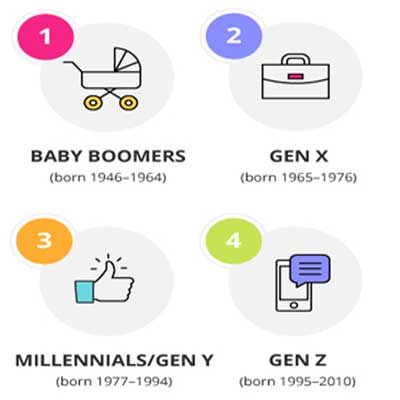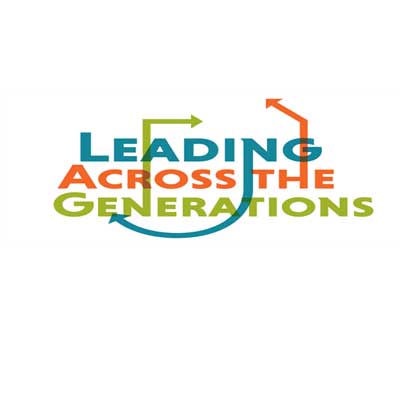The Battle of Generations in the workplace- Strengths and Weakness | Aparna Sharma | Senior HR Professional & Certified Corporate Director I Editor’s Collection
 The term ‘generation’ is traditionally used to refer to a group of people born and living during the same period of time, which usually spans 15 years. With four different generations making up today’s workforce, it can be difficult understanding what they all need and where they are best utilised. Each group brings a different dynamic to the table, but the only way to truly harness their potential is to understand their generational characteristics.
The term ‘generation’ is traditionally used to refer to a group of people born and living during the same period of time, which usually spans 15 years. With four different generations making up today’s workforce, it can be difficult understanding what they all need and where they are best utilised. Each group brings a different dynamic to the table, but the only way to truly harness their potential is to understand their generational characteristics.
That said, the supposed differences between generations in the workplace are more complex than many people realise. While one can see typical generational strengths and weaknesses coming through, prioritising continuous learning in the organization can help you build a network of valuable, connected professionals – no matter their age.
The different generations and how they work
The generations that are likely to be present in your office can be segmented into four distinct groups:

There are a number of strengths and weaknesses that can generally be found in each working generation:
Baby Boomers
Strengths
• Boomers are characterised as being workaholics who relish long weeks and overtime. They are more committed to their roles than any other generation
• Baby boomers are considered good team players, with 53 per cent of organisations saying they work well with others
• The professionals in this generation are regarded as making excellent mentors to their colleagues and juniors in the organisation
Weaknesses
• This generation has a preference for structure and discipline, and are less inclined to welcome change
• Boomers are competitive, so they need recognition and rewards to keep them motivated to achieve more
• Baby boomers are regarded as the least tech savvy of all generations, prohibiting their ability to keep up with developments
Gen X
Strengths
• The majority of organisations (70 per cent) believe Gen X are the best overall workers
• These professionals are committed to juggling work with family time, and favour work-life balance in an organisation
• Gen X is considered to be the biggest revenue generators overall
Weaknesses
• Less than 40 per cent of Gen X are satisfied with the senior management in their organisation
• This generation is less inclined to say something if they disagree with management than their successive generations
• Gen X value being able to do things quickly and are less inclined to spend hours of overtime completing something perfectly
Millenials / Gen Y
Strengths
• Of all generations currently featuring in the workforce, Millennials are considered the most independent workers
• Millennials are concerned with ethics and the social responsibility of the organisation they work for
• Millennials have grown up sourcing information, they need to be left to create their own processes rather than being told exactly what to do
Weaknesses
• Due to their independent nature, Millenials are not as interested in teamwork as other generations
• Millennials do not have as strong a work ethic, with an average of 38.8 hours spent at work a week compared to previous generations who both average above 40 hours
• This generation is impatient when it comes to career growth – 49 per cent are likely to leave before two years if they feel their skills are not being developed
Gen Z
Strengths
• The most tech competent of any generation, members of Gen Z are able to pick up new developments quicker than other employees
• This generation is particularly ambitious, with two-thirds of Gen Z saying their goal in life is to make it to the top of their profession
• Gen Z are natural entrepreneurs, with 72 per cent wanting to start their own business and hire people
• Described as the ‘always on’ generation, Gen Z are able to multitask unlike any other generation, using up to five screens at once
Weaknesses
• Gen Z are regarded as more cynical than their predecessors, favouring a realistic outlook over the idealism of Gen Y
• Gen Z don’t know much about a time before social media and easily accessible tech. This can make them very reliant on technology to solve problems
Developing your workforce
Each generation brings something uniquely valuable to the workforce. By understanding what they have to offer, one can identify key training and development opportunities that will align with their unique strengths. It will also help you gauge where skills gaps may lie so that you can prioritise filling them.
Relations among the generations seem to be at a low point. Gen Y (defined as people born after 1982) thinks Gen X (spawned between 1961 and 1981) is a bunch of whiners. Gen X sees Gen Y as arrogant and entitled. And everyone thinks the Baby Boomers (1943 to 1960) are self-absorbed workaholics.
Working
Research suggests that 68 percent of Baby Boomers feel “younger people” do not have as strong a work ethic as they do and that makes doing their own work harder. 32 percent of Gen X-ers believe the “younger generation” lacks a good work ethic and that this is a problem. And 13 percent of Gen Y-ers say the difference in work ethics across the generations causes friction. They believe they have a good work ethic for which they’re not given credit.
Technology is another flashpoint. In a survey conducted for job site CareerBuilder.com , nearly half the respondents noted Generation Y’s preference to communicate via blogs, IMs and text messages, rather than on the phone or face to face, methods preferred by Boomers and Generation X. Technologically facilitated communication can feel abrupt and easily be misunderstood by Boomers and Gen X-ers.
Why the Flashpoint Is Now
Generational clashes in the workplace are nothing new. What is new is the extent to which the retirement of the Boomers will leave employers scrambling to recruit and retain the talent they need. Most of those new workers will be Generation Y-ers.
No wonder that managing the generations effectively is emerging as one of the CXO’s most important challenges.
To address the workforce challenges of the future, CXO’s must transition their departments now. This means preparing staff and addressing issues that may be preventing, discouraging or undermining their ability to work in a collaborative manner.
Best Practices for Managing the Generations
 CXOs have to acknowledge the generational tensions their employees may be feeling. To get everyone working together, they need to understand the unique strengths and weaknesses of each generation and identify the points of friction among them.
CXOs have to acknowledge the generational tensions their employees may be feeling. To get everyone working together, they need to understand the unique strengths and weaknesses of each generation and identify the points of friction among them.
Of course, it’s important to remember that generalizations about the generations are just that. Age defines a demographic, not a person. We are, after all, talking about millions of individuals here, each with his or her own unique set of work and life experiences.
One has to pay attention to individual personalities. Knowing the individual is far more important than thinking about what generation they belong to.
Don’t think of it as bridging a gap; think of it as aligning the generations.


